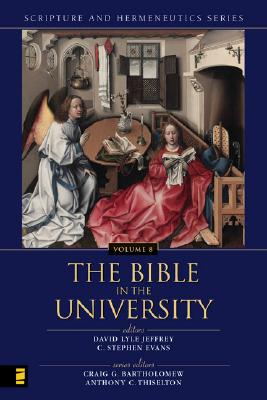
- Details
- Category: Recommended Reading Recommended Reading
- Published: 31 May 2010 31 May 2010
- Hits: 3865 3865

In the eighth and last volume in the "Scripture and Hermeneutics Series," David Lyle Jeffrey and C. Stephan Evans served as editors for The Bible and the University (Zondervan, 2007). I have read several of the essays, but to me the stand out is David Lyle Jeffrey's "Introduction" (which was also published in Touchstone magazine). The entire volume wrestles with the place of the Bible in the university. This question will strike some moderns (and particularly thoroughgoing secularists) as extremely odd, put historically the question was a fair one, and not a particularly shocking one (even if folks have historically disagreed on the role of the Bible in places of learning).
But Jeffrey's "Introduction" is simply excellent. As Jeffrey has written here and elsewhere, in the Christian West knowledge was always seen in relation to other and related goals like wisdom and virtue, and in relation to God. That is, Christians--at their best--have always seen the acquisition of knowledge against the backdrop of God, man, the world, and God's relationship to man and the rest of the created order. Man is a creature, and true knowledge must always be seen in relationship to the God who has created and rules over all things.
To forget wisdom is ultimately to cripple the educational enterprise, and we have been living amidst the ruins of this crippled enterprise for some time. Jeffrey's argument is radical and penetrating. He certainly is saying that we should seek to understand the relationship between knowledge and the lordship of Christ, and he certainly is saying that we should seek to grasp how to think Christianly about the acquisition of knowledge, and that such knowledge is always to be submitted to the universal lordship of Christ. But Jeffrey is saying a tad more than that. It is tempting in Christian colleges and universities to speak simply of a Christian "worldview" or of the "integration of faith and learning" (both fine realities, properly understood). But Jeffrey is also arguing that in the Christian West, the Bible itself was a central component of liberal learning. He writes (p. 7): "But here is the point too often missed: classical learning, indeed all types of learning in the monasteries and other communities of Christian education, was organized around a studium whose central preoccupation was with the bible as a foundation for all learning." Jeffrey goes on to summmarize Bonaventure (p. 8): "all knowledge is a light, or means of understanding, but the highest of all lights--superior to philosophical knowledge, to the knowledge arrived at by sense perception, and to the mastery of the mechanical arts--is the light of 'Sacred Scripture.'"
In Western culture, even more non and anti-Christian folks often engaged in their intellectual deliberations and inquiries against a backdrop shaped and prepared by Christian thinking. Thus, Jeffrey can write concerning Goethe (p. 10): "all Goethe's ambitions may be summarized as a wish not merely to translate but actually to rewrite the Bible."
Referring to the 12th century French thinker Hugh of St. Victor, Jeffrey writes (p. 14): "we cannot long thrive without a centering of our efforts upon the getting of wisdom." For Hugh, "the instrumentality of the humane disciplines to an intrinsic and higher good, namely wisdom in the learner of an abiding, life-changing and personally transcendent gravitas."
Everything I have read by Jeffrey has been wonderful. If you have not read this essay, I highly recommend it.